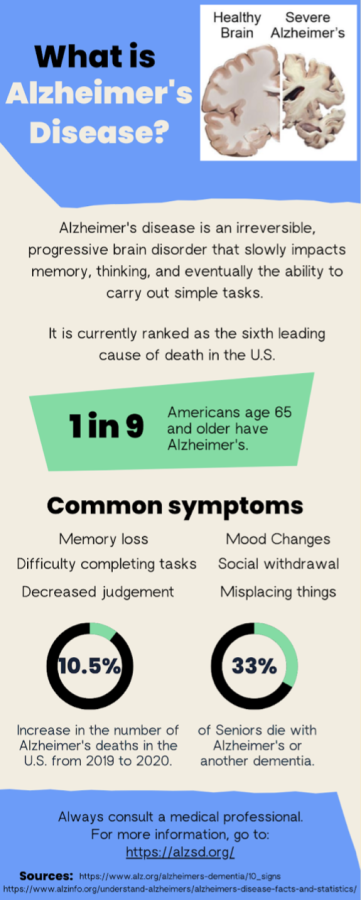An interview with Eugenia Welch for Alzheimer’s Awareness Month
UNPACKING ALZHEIMER’s: Illuminating statistics and facts about the prevalence of the disease in America
A national proclamation that November would be National Alzheimer’s Disease Awareness Month was issued in 1983 by Ronald Reagan in honor of over 6 million Americans suffering from it. AD is frequently cited as one of the cruelest diseases, where patients seemingly “disappear” as their memory, thinking and behavior whittles away. CEO of Alzheimer’s San Diego, Eugenia Welch, is actively working to combat the disease through her company’s efforts to empower seniors suffering from AD to plan for their own future care.
““Two of my family members died from Alzheimer’s, so it’s very personal for me,” Welch said. After being involved with the organization as a volunteer, I came to see the great things they’re doing everyday, so when I saw that the CEO position was available, I decided to apply.”
Welch has been serving as the CEO since March of 2018, but throughout her time involved with AlzSD, she noticed one major problem. AD patients are rarely afforded a say in directing their care.
“Just because someone has a diagnosis of dementia doesn’t mean they can’t participate in decision making,” Welch said. “I’ve seen too often that people stop addressing questions to patients automatically when they have a diagnosis. It’s really demeaning, and makes patients feel even more isolated.”
Actively combatting this stigma is one of the most rewarding parts about Welch’s job. She has seen firsthand how meeting with the clinical care coaches and hundreds of trained volunteers at AlzSD has allowed people to find comfort.
“Things that people are embarrassed to share are things [we] hear about all the time,” Welch said. “They find immense relief in knowing that they aren’t alone.”
One of the best examples of how AlzSD is raising awareness is through community-wide fundraising events, including their biggest event of the year, Walk4Alz, which took place last month on Oct.15. They far surpassed their $500,000 goal and raised $574,000 dollars which goes towards their many programs including AlzCompanions, a program that matches families with trained volunteers to provide care while the primary caretakers may be busy, and Take Me Home.
The Take Me Home program allows families to register a person with dementia or any developmental disability in case that person ever goes missing. The registry and a photograph will be held at the sheriff’s office and automatically have all descriptive information so law enforcement can begin searching right away.
“Take Me Home is very helpful in situations of wandering,” Welch said. “The saddest thing is it’s unique to San Diego County. Currently, we are doing advocacy to try and make it a state-wide standard, and possibly even in neighboring countries, because I’ve seen cases where patients wander all the way to Mexico. We also have a federal grant to raise more awareness and educate law enforcement and first responders about wandering.”
Recently, 84-year old Alzheimer’s sufferer Changyu Zhou of Irvine was reported missing on Oct. 30. Welch believes that Take Me Home would’ve been especially beneficial in this case, where an immediate response is crucial to preventing the individual from traveling too far.
To bring Take Me Home to Orange County and beyond, AlzSD needs all the support from community members and legislation they can get. Youth in particular are one of the most important parts of their organization.
“They don’t have as many preconceived notions as older people, and thus are more receptive to learning about the disease,” Welch said. “Also, many of them have been affected in their own families and this passion is what draws them to our cause.”
For Northwood students who may be struggling with a family member impacted by Alzheimer’s, Alzheimer’s Association Orange County, headquartered in Irvine, has resources available. Additionally, there are over 40 different support groups and social workers available at these organizations without age or cost involved. Welch encourages families to reach out.
“Get as much information as you can, and know you aren’t alone,” Welch said. “There are millions of other people going through the same thing, and working through this disease together is what gives them the strength to continue.”

Annabel Tiong is a Northwood senior and Junk Editor for The Howler. She holds...



![AAAAAND ANOTHER THING: [CENSORED] [REDACTED] [BABY SCREAMING] [SIRENS] [SILENCE].](https://thehowleronline.org/wp-content/uploads/2025/06/lucy-1200x800.jpg)















































